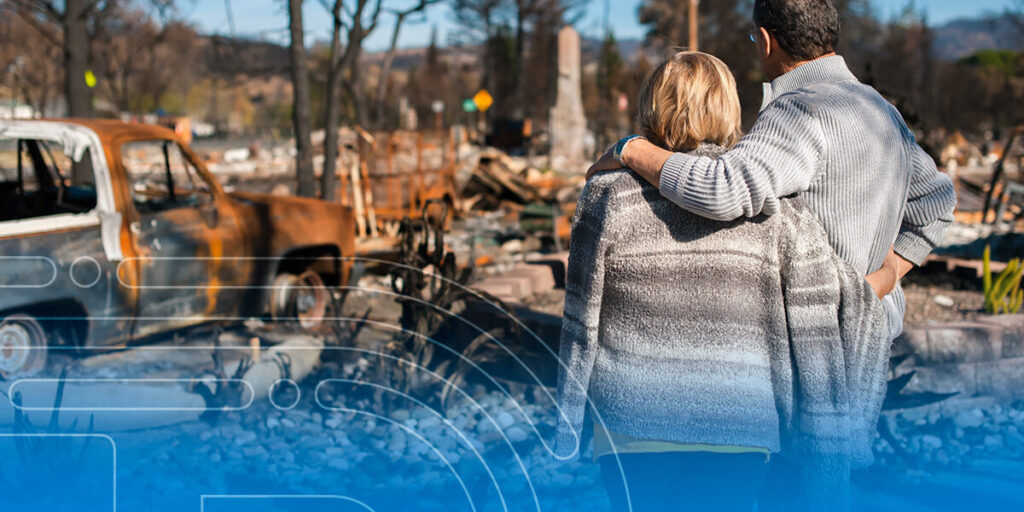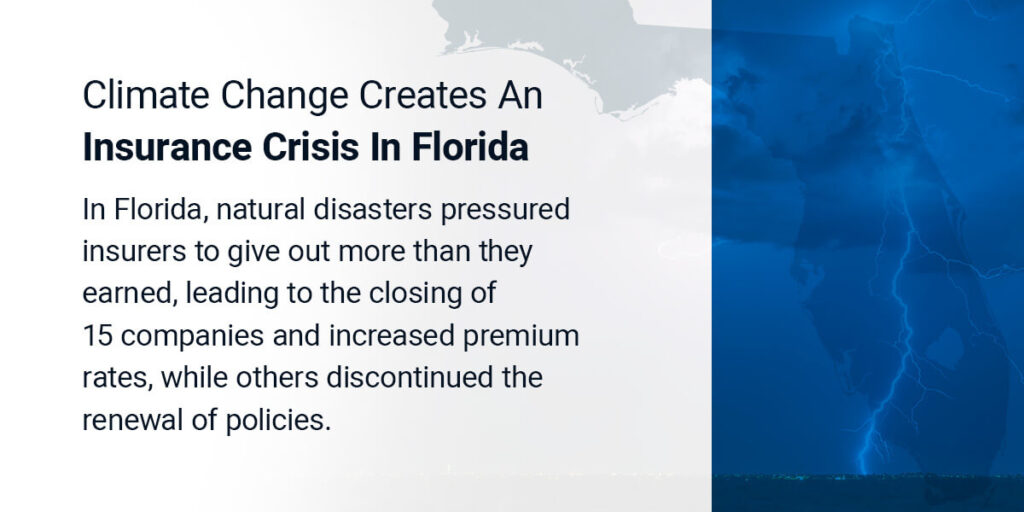
California is in the midst of a major insurance crisis that has caused numerous insurance companies like State Farm and Allstate to stop providing coverage in the state. As a result, new California homeowners may find it challenging to insure their homes. But what do all these California insurance issues entail, and why are they causing major insurance companies to leave?
The effects of climate change are becoming increasingly apparent, with various natural disasters like hurricanes and wildfires impacting communities worldwide on a daily basis. California experiences numerous kinds of weather-related disasters, including earthquakes, drought and wildfires. Over the past five years in California alone, wildfires have burned down 40,000 homes and nearly 1 million acres of forest.
These disastrous situations have caused California to see record-high wildfire losses. In 2017, California experienced its most destructive wildfire year in history, which caused California insurers to pay $15.4 billion in losses. An even more extreme wildfire followed this one in 2018, costing insurers an additional $13.6 billion. This means that for two years straight, insurance companies paid $1.85 in losses for every $1.00 of earned premium.
After receiving various rate increase requests from around 50 insurance companies, the California Department of Insurance approved 71 of these requests in 2019 to alleviate the situation. Additionally, they approved 79 rate increase requests the following year, resulting in many homeowners seeing a significant price increase.
The state of California’s insurance crisis reached its peak in 2019, with insurance companies avoiding the renewal of over 230,000 policies. This caused a 225% increase in new policies registered with the California FAIR Plan as a last resort for homeowners needing coverage.
To slow down the surge of nonrenewals and FAIR Plan policy registrations, the California Department of Insurance started barring insurance companies from nonrenewing and canceling policies in wildfire-prone areas. At the same time, insurers must follow Proposition 103, which requires insurance companies to justify rate increase requests before the California Department of Insurance can decide whether to approve them.
This makes it challenging for insurers to compensate for premiums despite the exponential rise in wildfire losses over the past 10 years. Rather than taking the risk, many insurers began avoiding taking on new clients from certain areas or moving their business to a different state altogether. This is apparent in California’s latest rate increase statistics, with only 29 rate increases being approved in 2022 as opposed to 79 approvals in 2020.
California insurance news has started to affect other states, too. States like Florida, Louisiana and Colorado also experience the disastrous effects of climate change, straining multiple insurers. According to insurance professionals, this insurance coverage problem applies to all 50 states, but California, Florida, Texas, Colorado, Louisana and New York are the hardest states to insure homes in.

In Florida, natural disasters pressured insurers to give out more than they earned, leading to the closing of 15 companies and increased premium rates, while others discontinued the renewal of policies. As a result, the Florida Insurance Guaranty Association received some 50,000 policies from residents who hope to gain money that will help them repair their homes.
To counter the situation, Florida lawmakers implemented three new bills to improve the property insurance market. These three measures require insurance companies to cap their premium rates, restrict them from claiming insolvency, encourage insurance companies from other states to do business in Florida, and prohibit insurers from denying claims if their reasoning was invalid. The state enacted an additional bill after these measures proved ineffective, which aims to get insurers to meet particular requirements when discontinuing the writing of new policies.
Have Questions? Contact Us Today!
In Louisiana, 11 insurance companies have gone bankrupt and over 50 insurers have avoided taking on new clients since Hurricane Laura hit in 2020. To stabilize the insurance market, the state enacted legislation that allotted $45 million to an incentive program with a proven record of lowering rates, encouraging new insurance companies to do business in Louisiana and existing insurers to write new policies.
Just as wildfires affect insurance in California, Colorado experiences similar occurrences. To alleviate the pressure on the insurance market, Colorado lawmakers enacted a new bill to ensure residents can secure a property insurance plan.
Another state familiar with the effects of natural disasters is Missouri, which experiences tornadoes, flooding and earthquakes. According to a DCI report, only 12.7% of Missouri residents have earthquake coverage, as opposed to the 60.2% coverage the state used to have just 20 years prior. This decrease in coverage may be due to rising insurance rates in the area.
A 2021 homeowners insurance study states that many residents along the Texas coast have uninsured homes. In areas like McAllen and Brownville, nearly two out of five households are uninsured despite their vulnerability to hurricanes.
Despite the various efforts of state lawmakers to maintain insurance stability, many residents are finding it challenging to keep their homes insured. In certain high-risk states like Florida, insurance has become too expensive for some residents to afford — the average premium rate has risen by 40% to $6,000. Given the circumstances, individuals with lower incomes may choose to go without this critical coverage due to high renewal costs and rate increases.
As a family-owned insurance firm that’s been in the business for over 15 years, we understand the importance of keeping your home insured and secured. We care about your best interests — that’s why we work with you to decide on the most affordable and applicable insurance options for your situation.
If you live within a 30-mile radius of Union, Missouri, allow us to help you explore the best home insurance options for you. Reach out and request a quote with us today to get started.
